Americans take a dim view of both political parties, leading Republican and Democratic figures
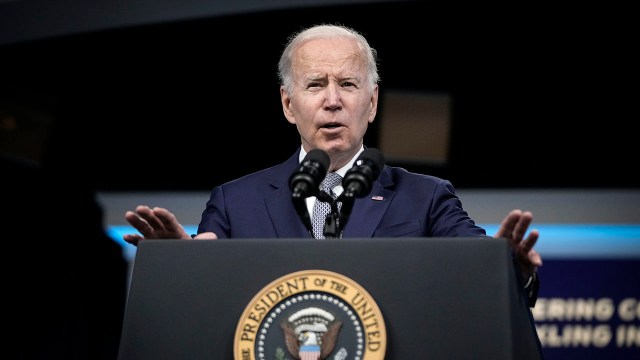
Pew Research Center conducted this study to understand the public’s views on President Joe Biden, other congressional leaders and the nation’s economy. For this analysis, we surveyed 6,174 U.S. adults between June 27 and July 4, 2022. Everyone who took part in this survey is a member of the Center’s American Trends Panel (ATP), an online survey panel that is recruited through national, random sampling of residential addresses. This way nearly all U.S. adults have a chance of selection. The survey is weighted to be representative of the U.S. adult population by gender, race, ethnicity, partisan affiliation, education and other categories. Read more about the ATP’s methodology.
Here are the questions used for the report and its methodology.
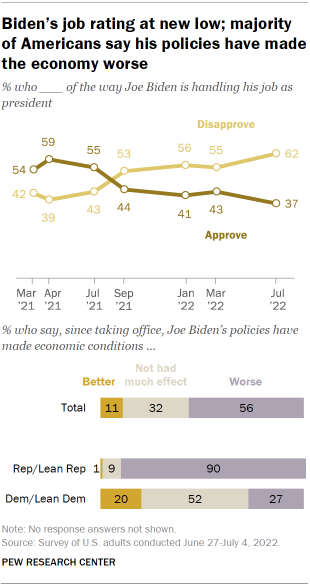
With public views of the nation’s economy at their most negative in years, Joe Biden’s political standing is at the lowest point of his presidency. Yet Biden is hardly the only focal point of the country’s political discontent: Americans express unfavorable views of both major parties and a range of leading political figures, including Biden’s predecessor, Donald Trump.
Biden’s current job approval numbers are the lowest since he became president, with 37% of U.S. adults saying they approve of how he is handling his job as president while 62% disapprove. Biden’s job rating has declined 6 percentage points since March (43%) and 18 points over the past year; last July, a 55% majority approved of Biden’s job performance.
Amid persistent inflation, the public’s views of the national economy have worsened since the start of this year. Today, just 13% of adults say economic conditions in the United States are excellent or good; 28% said this six months ago.
A majority of Americans say Biden’s policies have hurt the economy: 56% now say his policies have made economic conditions worse, compared with just 11% who say his policies have improved the economy. About a third (32%) say they have not had much of an effect. The share of Americans who say Biden’s policies have made economic conditions worse has increased 16 percentage points since last September.
Views of the economy – and the impact of the president’s policies on economic conditions – have long been deeply divided along partisan lines. Still, only 20% of Democrats and Democratic-leaning independents say Biden’s policies have made the economy better, while 52% say they have had little impact and 27% say they have made things worse. Among Republicans and Republican leaners, 90% say Biden’s policies have made the economy worse.
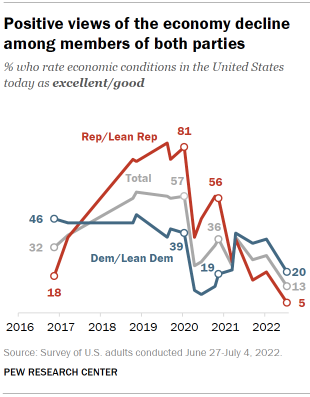
A new Pew Research Center survey of 6,174 U.S. adults, conducted June 27 to July 4, finds that just 20% of Democrats and 5% of Republicans rate the nation’s economic conditions as excellent or good. These opinions have declined substantially since January, when 36% of Democrats and 20% of Republicans viewed the economy positively. Currently, Republicans are far more likely than Democrats to rate conditions as poor (67% vs. 32%); Democrats are more likely to say they are “only fair” (47% vs. 28%).
The public’s economic concerns are dominated by worries over rising prices. Three-quarters of Americans say they are very concerned about rising prices for food and consumer goods; an identical share say they are very concerned about rising prices for gasoline and energy. Majorities in almost every demographic group say they are very worried about rising prices for food and energy.
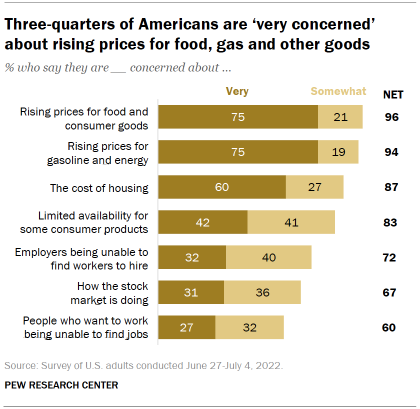
Among five other issues asked about, the cost of housing is the next most concerning for the public, with six-in-ten saying they are very concerned about this. About four-in-ten (42%) are very concerned about limited availability for some consumer products. Fewer Americans say they are very concerned about employers finding workers to hire (32%), the performance of the stock market (31%) or people being unable to find jobs (27%).
When asked to assess possible causes for inflation, nearly half of adults (49%) say “businesses taking advantage of economic conditions to increase their profits” has contributed a lot to rising prices. Nearly as many (45%) cite the impact of COVID-19 on manufacturing and shipping.
Fewer say that Russia’s invasion of Ukraine (39%), government aid to deal with the economic impact of the pandemic (32%), or the fact that interest rates were very low until recently (25%) have contributed a lot to rising prices.
Democrats are much more likely than Republicans to say Russia’s invasion of Ukraine and businesses taking advantage of conditions to increase profits are major factors driving inflation. Republicans, by contrast, are more likely to point to the government’s aid to deal with economic impact of the pandemic.
Other important findings from the survey
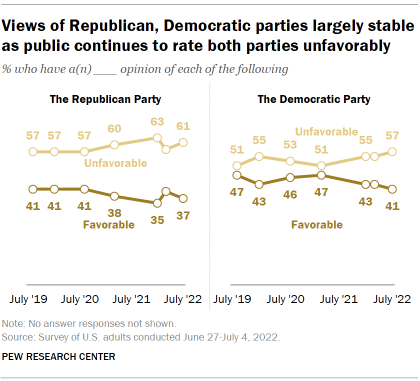
Both parties continue to be viewed unfavorably. With less than four months until the midterm elections, neither party is very popular with the public. Slightly more Americans say they view the Democratic Party (41%) favorably than say so about the Republican Party (37%), but clear majorities view both parties unfavorably (61% for the GOP and 57% for the Democrats).
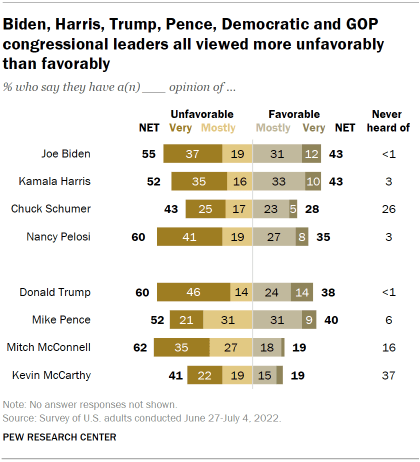
Biden, Trump, congressional leaders viewed more negatively than positively. The public’s views of eight political leaders included on the survey – including Biden and Trump – are all unfavorable overall. The public gives Biden (43% favorable vs. 55% unfavorable) slightly better ratings than Trump (38% vs. 60%). Congressional leaders fare the worst, with Senate minority leader Mitch McConnell and Speaker of the House Nancy Pelosi each viewed unfavorably by about six-in-ten Americans (62% McConnell and 60% Pelosi). Views of Vice President Kamala Harris and former Vice President Mike Pence are somewhat more positive, yet both are still underwater in their personal favorability ratings.
Biden is viewed negatively – but better than Trump – on some dimensions. Evaluations of Biden’s performance in specific areas are largely negative – as they were for Trump at a similar point in his presidency – but Biden outperforms Trump on setting “a high moral standard for the presidency” (43% say Biden has definitely or probably done this, compared with 27% who said it about Trump in August 2018) and running “an open and transparent administration” (44% say this about Biden today vs. 37% about Trump four years ago). However, more said Trump improved the way government worked (37% in 2018) than say this about Biden today (29%).
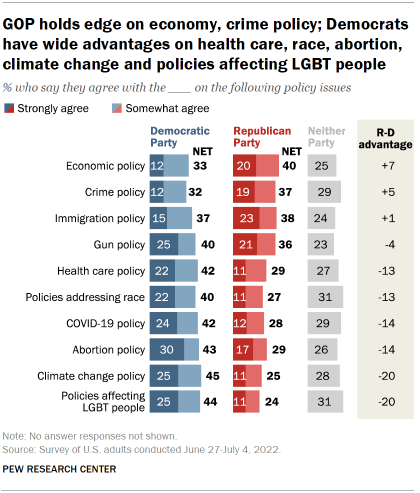
More agree with the GOP than with Democrats on economic policy, but Democrats have edge on most issues. Americans are more likely to say they agree with the Democratic Party than the Republican Party on a number of key issues – including policies on health care, race, COVID-19 and climate change as well as policies affecting LGBT people.
However, the Republican Party holds a 7 percentage point advantage on the economy: 40% Americans say they agree with the GOP on economic policy, compared with a third who say they agree with the Democratic Party.
With abortion policy in the spotlight following the Supreme Court’s decision to overturn Roe v. Wade, 43% say they agree with the Democrats on abortion policy, while 29% say that about Republicans; another 26% say they agree with neither party on abortion policy.


